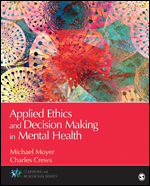
June, 2016 | SAGE Publications, Inc
Applied Ethics and Decision Making in Mental Health
Michael S. Moyer - University of Texas, San Antonio, USA
Charles R. Crews - Texas Tech University, USA
464 pages
| June, 2016
| SAGE Publications, Inc
Instant Access!
eBook
ISBN: 9781506346526
Paperback
ISBN: 9781483349756
$135.00
Instant Access!
eBook
ISBN: 9781506346526
“Moyer and Crews move beyond simply presenting and explaining the ethical code. In this book, they challenge counselors-in-training to grapple with their own values and understand how ethical decision-making is influenced by the lens through which they see the world as much as it is influenced by the actual code.”
–Kristi Gibbs, University of Tennessee at Chattanooga
Applied Ethics and Decision Making in Mental Health covers professional issues and ethical decision making related to the codes of ethics of the American Counseling Association, the American Psychological Association, and the American Association for Marriage and Family Therapy in an easy-to-read format, connecting ethical standards to real-life scenarios. This book not only focuses on the various aspects of legal issues and codes of ethics, but also includes ethical decision making models and exploration into the philosophy behind ethical decision making. By challenging readers to understand their own morals, values, and beliefs, this in-depth guide encourages critical thinking, real world application, and classroom discussion using case illustrations, exercises, and examples of real dialogue in every chapter.
–Kristi Gibbs, University of Tennessee at Chattanooga
Applied Ethics and Decision Making in Mental Health covers professional issues and ethical decision making related to the codes of ethics of the American Counseling Association, the American Psychological Association, and the American Association for Marriage and Family Therapy in an easy-to-read format, connecting ethical standards to real-life scenarios. This book not only focuses on the various aspects of legal issues and codes of ethics, but also includes ethical decision making models and exploration into the philosophy behind ethical decision making. By challenging readers to understand their own morals, values, and beliefs, this in-depth guide encourages critical thinking, real world application, and classroom discussion using case illustrations, exercises, and examples of real dialogue in every chapter.
Available formats
ISBN: 9781506346526
eBook
Suggested Retail Price: $52.00
Bookstore Price: $41.60
ISBN: 9781506346526
eBook
Suggested Retail Price: $58.00
Bookstore Price: $46.40
ISBN: 9781506346526
eBook
Suggested Retail Price: $65.00
Bookstore Price: $52.00
ISBN: 9781506346526
eBook
Suggested Retail Price: $94.24
Bookstore Price: $75.39
ISBN: 9781483349756
Paperback
Suggested Retail Price: $135.00
Bookstore Price: $108.00
See what’s new to this edition by selecting the Features tab on this page. Should you need additional information or have questions regarding the HEOA information provided for this title, including what is new to this edition, please email sageheoa@sagepub.com. Please include your name, contact information, and the name of the title for which you would like more information. For information on the HEOA, please go to http://ed.gov/policy/highered/leg/hea08/index.html.
For assistance with your order: Please email us at textsales@sagepub.com or connect with your SAGE representative.
SAGE
2455 Teller Road
Thousand Oaks, CA 91320
www.sagepub.com
Defining Ethics
Codes of Ethics
Principle Ethics
Ethics as Philosophy
Counselor Self-Awareness
Stress in Counseling
Wellness Model
Counselor Credentialing
Professional Associations
Overview of Ethical Decision Making
Ethical Decision Making Models
Summary of Decision Making Models
Legal Decision Making
Avoiding Ethical Problems
Multicultural Competence and Understanding Diversity
Diversity Considerations in the Counseling Relationship
Diversity Considerations in Diagnosis and Assessment
Diversity Considerations in Counselor Education and Supervision
Client Rights
Counselor Responsibilities
Confidentiality
Duty to Protect
Duty to Warn
End of Life Decisions
Contagious, Life-threatening Diseases
Court Ordered Disclosures
Sharing Information with Subordinates, Interdisciplinary Teams, and Third Party Payers
Considerations
Confidentiality vs. Privacy
Storage and Disposal Records
Waiting Rooms
Credit Card Billing
Phone Calls
Public Encounters
Mandatory Reporting (Protecting Children and Vulnerable Adults)
Theory and Techniques
Diagnosis
Professional Relationships
Advertising
Fees and Billing
Referrals
Credentials
Maintaining Boundaries with Clients
Social Relationships with Clients
Sexual Attraction to Clients
Receiving Gifts
Bartering
Informed Consent
Security Standards
Social Media
Records Storage
Web Maintenance
Multicultural and Disability Considerations
Ethics in Group Work
Counseling Couples and Families
Informed Consent
Confidentiality
Clear and Foreseeable Harm
Confidentiality and Sharing Information with Parents and School Personnel
Responsibilities to the School
Student Records
Responsibilities of Counselor Education Programs
Curriculum
Responsibilities of Counselor Educators
Roles and Relationships between Counselor Educators and Students
Supervisor Competency
Informed Consent
Responsibilities of Supervisors
Relationships between Supervisors and Supervisees
Researcher Responsibilities
Rights of Research Participants
Researcher and Participant Relationships
Reporting Results
Publications
KEY FEATURES:
- Ethical dilemmas within each chapter relate to every ethical standard showing students how and when specific ethical standards may apply.
- Each chapter has multiple ethical dilemmas providing an application-based analysis rather than theory based.
- Case illustrations demonstrate critical examination of ethical guidelines and interpret standards in ways that best provide for the client.
- APA and AAMFT ethical codes have been infused alongside the ACA code of ethics to provide multiple perspectives applicable to a range of mental health professionals.
